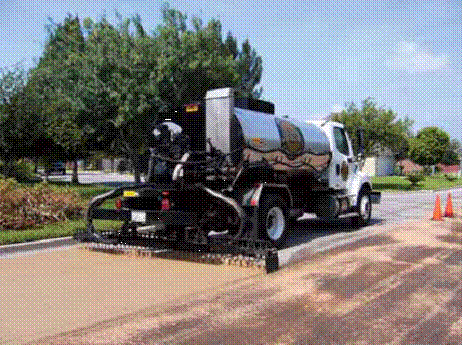

|
References |


|
Rejuvenator Seal Extends Life of Austin, Travis County, Tex. Roads
|
|
Texas’ dynamic capital of Austin is located within Travis County, and a great majority of the road network encompasses Austin. This road system is a blend of moderate and highly traveled residential curb and gutter and lower volume rural areas. Texas uses a gradation numbering system consisting of Type A and B, which are coarse and fi ne base course mixes; Type C and D being coarse and fi ne hot mix; and Type F being a fi ne-graded, high asphalted hot mix used for thin overlays. Travis County Director of Road Maintenance and Fleet Services Don Ward inherited the maintenance challenge of how to preserve 125 two-lane miles of F mix roadway. Originally F mix was used in residential curb and gutter subdivisions to provide a smooth, appealing surface. But it became evident within four to five years that this mix was prone to weathering and intrusion of moisture, while the high asphalt percent was causing premature oxidation and brittleness in the |

|
Pavement Restoration, Inc., Boerne, Tex., applies Reclamite rejuvenator to pavement in Travis County, Tex. |
|
binder as the lighter oils oxidized from the binder. The county needed a solution to prolong the life of a considerable F mix inventory. MALTENE-BASED REJUVENATOR STUDIED In 2005, Travis County looked at the use of a maltene-based rejuvenator that has had over 40 years of use in North America. Rob Wiggins, president of Pavement Restoration, Inc., Boerne |
|
Tex., reviewed the road inventory with Don Ward and along with Tricor, the manufacturer, provided factual data incorporating many years of experience of how a rejuvenator could extend the county’s pavement life cycles. About that time Travis County executives realized that they needed to be proactive regarding road maintenance. The county Commissioners Court approved this rejuvenation process with an eye to extending pavement life an additional five to eight |
|
years, and hopefully beyond with subsequent applications. The county placed several full roadwidth test sections of the rejuvenating agent. They saw excellent absorption and penetration into the binder. Testing done by APART, Inc. (Asphalt Pavement and Recycling Technologies, Inc., Shafter, Calif.) revealed to Travis County that the rejuvenator was fluxing with the binder, and results showed a decrease in microviscosity of the binder in the range of 60 to 300 |
|
By Jim Brownridge Marketing Manager Tricor Refining, LLC, Bakersfield, Calif. |